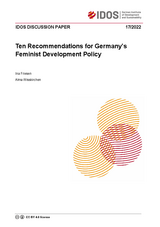Ten recommendations for Germany’s feminist development policy
Friesen, Ina / Alma WisskirchenDiscussion Paper (17/2022)
Bonn: German Institute of Development and Sustainability (IDOS)
ISBN: 978-3-96021-196-9
DOI: https://doi.org/10.23661/idp17.2022
Preis: 6 €
In early 2022, Germany’s development minister Svenja Schulze announced the adoption of a feminist development policy. With this announcement, Germany joins a growing group of governments that have adopted or declared the adoption of an explicitly feminist perspective in their external policies. Drawing on these governments’ policies and the observations and recommendations by civil society and researchers, this Discussion Paper outlines ten key recommendations for Germany’s first feminist development policy. The first three recommendations focus on the conceptual foundation of the policy and lay out the importance of 1) an inclusive definition of gender, 2) a clarification of the feminist approach and the policy’s overall goal as well as 3) the need for an intersectional approach. The second set of recommendations concerns the implementation of the policy and stresses the importance of 4) a permanent cooperation with gender-focused and feminist organisations and 5) the necessity to increase funding for gender-related objectives in general and 6) for feminist organisations in particular. Further recommendations include 7) widening the range of sectors that target gender equality through a transformative approach and context-sensitive programming and by providing mechanisms to monitor and evaluate the implementation of the strategy’s goals, objectives and activities. The last three recommendations emphasise institutional aspects and the importance of 8) creating an institutional environment that best supports gender equality within the development ministry and its main implementing organisations, 9) the necessity of a coherent feminist approach between the different ministries, and 10) the importance of addressing possible challenges the ministry might face in the implementation of its feminist development policy.



